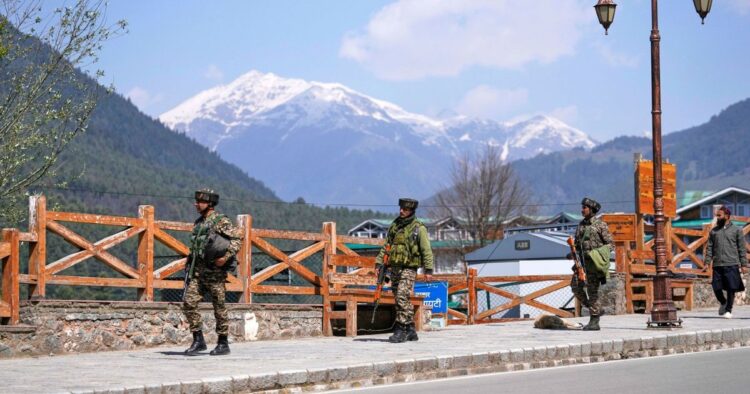KEY POINTS
- World condemns Pahalgam attack and urges calm
- Pakistan-based terrorists confirmed involved
- India takes strong diplomatic action
On April 22, a brutal terrorist attack in the scenic Baisaran Valley of Pahalgam shook India and the global community. Gunmen, allegedly affiliated with Pakistan-based terror outfits, targeted Hindu tourists after verifying their religious identity in a horrifying display of hatred. The methodical nature of the assault, forcing victims to produce ID cards, recite Islamic verses, and even lower their trousers to prove they weren’t Muslim, left no doubt that it was a premeditated hate crime aimed at spreading religious fear. 26 innocent lives were lost, and several others were severely injured.
Indian Response and Global Condemnation
India reacted swiftly and decisively, both on the diplomatic front and within its borders. The Modi government launched an aggressive crackdown, suspending the Indus Water Treaty, revoking Pakistani nationals’ visas, and banning Pakistan-linked social media handles within India. Simultaneously, it called for global attention and accountability, urging the world to recognize the “cross-border linkages” behind this attack. The perpetrators, including two Pakistani nationals and one local militant trained in Pakistan, have been named by Indian authorities, with rewards offered for information leading to their arrest.
United States Urges Accountability and Solidarity with India
In a rare show of urgency, the United States took direct diplomatic steps. Secretary of State Marco Rubio condemned the attack, urging Pakistan to restore communication and cooperate in the investigation. The U.S. also emphasized its support for India’s fight against terrorism and called on both countries to avoid escalation. State Department officials, including spokesperson Tammy Bruce, reaffirmed America’s commitment to peace in South Asia while clearly supporting India’s right to justice and security.
Russia Stands for Peace but Doesn’t Ignore the Source
Russia, while urging restraint and peaceful dialogue, acknowledged the sensitivity of the situation by meeting with Pakistani representatives and encouraging constructive discussions. Although neutral in tone, Russia’s call for calm came after acknowledging the rising tension stemming from Pakistan’s support of extremist elements. It is evident that Russia, despite balancing relations with both countries, does not ignore Pakistan’s pattern of sheltering militants.
China’s Biased Stance Reflects Strategic Alignment
While most global powers showed solidarity with India, China took a visibly different route. It echoed Pakistan’s demand for an independent investigation and continued its historical support for its “iron brother.” Despite claiming to support counter-terrorism efforts globally, China’s refusal to name the perpetrators or acknowledge Pakistan’s involvement exposes its strategic alignment rather than a commitment to justice. By backing Pakistan’s narrative, China undermines international efforts to hold terror networks accountable.
UK Voices Worry Over Domestic Unrest, Supports India Quietly
The United Kingdom, though measured in its language, supported India’s demand for justice. British ministers raised concerns about Pakistan-linked provocations within the UK itself, pointing to how regional tensions had begun spilling into British communities. From throat-slitting gestures by Pakistani officials to protests that turned violent, UK’s response recognized how Pakistan’s narrative fuels unrest even outside South Asia. Minister Hamish Falconer assured the security of Indian interests in the UK and supported India’s pursuit of justice through lawful channels.
The Gulf countries – Qatar, Saudi Arabia, Kuwait, and the UAE, called for restraint and dialogue, highlighting their desire for regional stability. Their response, although diplomatic and cautious, did not question India’s right to seek justice nor did it endorse Pakistan’s claims. Instead, they urged peaceful conflict resolution, a message subtly directed at Pakistan’s aggressive posturing post-attack.
The United Nations condemned the terror attack unequivocally, emphasizing accountability and lawful justice. UN Secretary-General Antonio Guterres personally engaged with both Indian and Pakistani leaders, offering mediation and warning against escalated confrontation. Similarly, the EU urged caution, while stressing the importance of keeping communication open. The bloc emphasized avoiding military responses, but acknowledged that the gravity of the attack warrants a firm, coordinated response.
Pakistan’s Provocation and Misdirection
Despite overwhelming international concern, Pakistan attempted to shift the narrative by accusing India of planning a military strike. Its information minister claimed India would retaliate within 24-36 hours, a move widely seen as an attempt to gather sympathy and deflect attention from its own complicity. Pakistan’s track record of hosting, training, and enabling groups like Lashkar-e-Taiba continues to undermine its credibility in global forums.
Despite the emotional gravity of the loss, India has not resorted to knee-jerk retaliation. It is using legal, diplomatic, and strategic tools to isolate Pakistan and strengthen its case globally. High-level diplomatic visits continue, with Defence Minister Rajnath Singh’s visit to Russia and hosting of Angola’s president serving as signs that India refuses to let terrorism derail its diplomatic momentum.
The Pahalgam terror attack is not just an act of violence, it is a challenge to global conscience. The religious profiling, brutal execution, and cross-border planning underline the dangerous nexus of terrorism and state support. While India mourns, it also demands global accountability.

















Comments